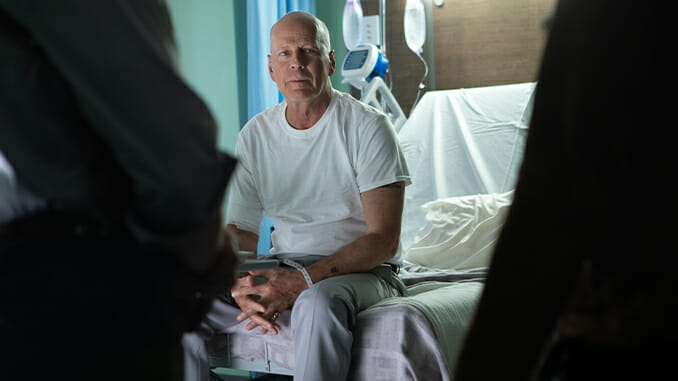Michael Rooker and Bruce Willis Ruminate in Jesse V. Johnson’s White Elephant
Photos courtesy of RLJE Films
Since 2017, Jesse V. Johnson has made 10 films, three released in 2019 and six of which star the DTV writer-director’s primary muse since Savage Dog, Scott Adkins. These include Johnson’s contemporary calling card, Avengement, a gruesomely satisfying, small-scale martial arts thriller built around Adkins. Scott Adkins is not in White Elephant, just as he wasn’t in last year’s brisk and gritty WWII actioner, Hell Hath No Fury. Though supporting Johnsonian Guys like Louis Mandylor and Dominiquie Vandenberg keep Fury familiar and efficient, White Elephant drags through tone and genre—from mob flick with dimestore outlaw swagger to grim John-Wick-esque home invasion massacre—with little energy or salient vision. I’d bet it’s more handsomely realized than the other 10 or so films which could arguably be Bruce Willis’s last, but as an ensemble piece promising old hands like Michael Rooker and John Malkovich amidst moody, well-choreographed brutality, it mostly feels like the work of an artist still searching for inspiration.
Johnson’s Romeo and Juliet reimagining, 2017’s The Beautiful Ones, operates as more of an effusive romance between the director and all the movies he clearly adores than an archetypal affair between star-struck lovers, assembling parts of Steve McQueen and Japanese noir and French crime (Breathless and La Cercle Rouge alike) and absurd bursts of Peckinpah-like bloodshed into something that, while never more than the mechanical sum of its parts, whiffed of voracious film fandom. If his appearance on Joe Dante and Josh Olsen’s podcast The Movies That Made Me can attest, Johnson is a passionate cinephile, and while his origins in stunt performance inform his effortlessness with directing action, his filmography is almost delightfully anti-auteur, fueled by a need to excavate his own taste to see where he’s most fulfilled—to interrogate what he consumes to figure out what he can create—and not by an abiding artistic voice. The most interesting thing that can be said of White Elephant is that its shape never really quits shifting. Johnson, similarly, is a restless filmmaker. Can an auteur truly be game for whatever?
Anchored by a stolidly warm performance from Michael Rooker, a man whose filmography more than fills out with tombstone-faced psychopaths, White Elephant details the final job of enforcer Gabriel Tancredi (Rooker), pit between loyalty to mob boss Arnold Solomon (Willis) and redemption in helping a detective (Olga Kurylenko) with a price on her head. Johnson’s gangland, shot by Jonathan Hall—who’s been by Johnson’s side on seven of his past eight projects—seems to consist purely of liminal space, where even an Italian restaurant festooned in faux rustic charm, in which apparently high-ranking mafiosos hang out, bears the aura of the in-between. Dry conversations occur in faceless cars and offices—a mausoleum is a hallway too, but offers some colorful reprieve—evil a banal and bloodless business, except for when blood gets everywhere. Add to these drab, scummy spaces the tired visage of John Malkovich as Professional Corrupt Lawyer Glen Follett, his performance best described as “undemanding,” and Rooker’s simmering presence as the most reassuringly competent mass-murderer in any room. In turn, White Elephant too often proceeds as dull and dreamy, an occasionally violent eulogy for a life of crime for which we have little context. We know Gabe’s wife, a wildlife activist, died a few years before; we know, as Gabe mentions to his young upstart of a partner (Vedhar Durbez), that he wants to finally do what his wife always wanted him to do, which is to get out of the life. To, as he explains very sincerely, use his military and homicidal training to go save the elephants in Africa. Which: great. Happy for him.
-

-

-

-

-

-

-

-

-

-

-

-

-

-

-

-

-

-

-

-

-

-

-

-

-

-

-

-

-

-

-

-

-

-

-

-

-

-

-

-








































